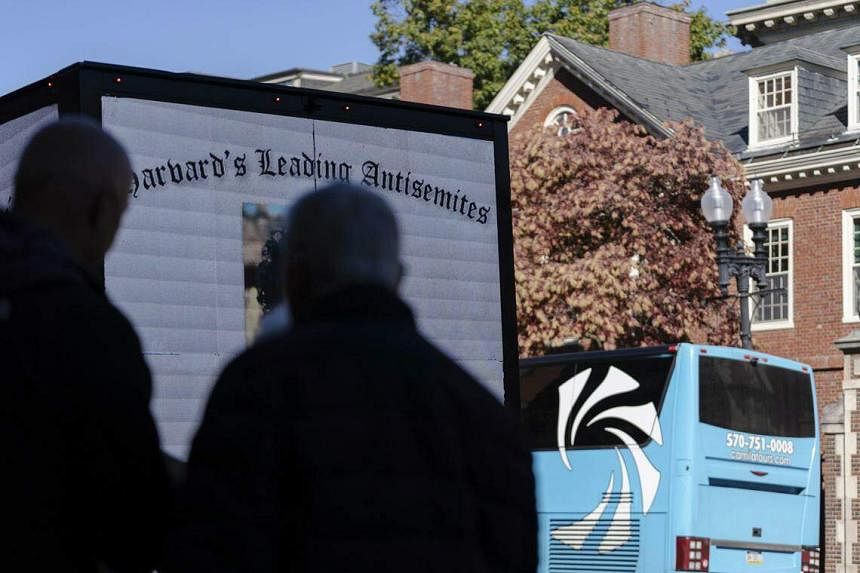NEW YORK – With the Israel-Hamas conflict unleashing furious emotions, American universities have struggled to walk an almost impossibly narrow line: Satisfying the demands of rich donors that they more clearly support Israel, while also respecting protesters’ rights of free expression.
Several wealthy Americans have threatened to withdraw their financial support from prestigious private schools like the Ivy League’s Harvard University in Massachusetts, or the University of Pennsylvania, known as UPenn.
The Wexner Foundation, which works to prepare young Jewish leaders in North America and Israel, went a step further: It ended its partnership with Harvard’s Kennedy School.
Citing what it called the “dismal failure of Harvard’s leadership to take a clear and unequivocal stand against the barbaric murders of innocent Israeli civilians by terrorists”, the Wexner family, founders of the Bath & Body Works chain, formally severed their ties to the school.
Meantime, Mr Marc Rowan, the chief executive of the Apollo Global Management investment fund and a major donor to UPenn, demanded the resignation of the school’s president Elizabeth Magill.
He criticised her in particular for the school’s hosting two weeks earlier of a festival of Palestinian literature which, he said, included some “well-known anti-Semites and fomenters of hate and racism”.
Mr Kenneth Griffin, the CEO of the Citadel investment fund and one of Harvard’s biggest donors, and Mr Ronald Lauder, heir to the Estee Lauder cosmetics group and another UPenn donor, have also expressed their displeasure, according to American media.
Forced to choose
“Leaders are criticised for not speaking out quickly or forcefully enough. They’re being forced to choose sides. And yet there are many who say that given a diversity of perspectives on campus, there can’t be an institutional position on such complex global issues,” said American Association of Colleges and Universities president Lynn Pasquerella.
At Harvard, president Claudine Gay did condemn the Hamas attacks of Oct 7, but her critics say her words were too timid and came too late.

Leaders of Stanford University, in California, and Columbia, in New York, have also been urged to clearly take their distance from pro-Palestinian student groups that accuse Israel, in their leaflets and at their rallies, of committing “genocide”.
But a group of Harvard professors has also called for an end to the online harassment of students who supposedly signed an incendiary letter against Israel.
A vehicle driving near campus carried a large screen displaying names and photos under the title “Harvard’s leading anti-Semites”.
Student protesters at Columbia have faced a similar backlash.
“What we are hearing directly is that some students on some campuses are feeling nervous to talk – nervous, perhaps, to protest,” said Ms Kristen Shahverdian, who works on education issues at PEN America, which promotes literature and free expression.
“That feeling of fear, I think, is palpable for some on campuses,” she said.

Political fractures
In the United States, freedom of expression is fiercely protected, and leaders on several campuses invoke the so-called Kalven Committee report of 1967.
Issued by the University of Chicago at a time of angry protests against the Vietnam War and amid rioting over civil rights, the report concluded that the role of universities should be to promote a diversity of opinions, not to take stands on contentious issues.
Ms Pasquerella said the pressure from donors undermines the purpose of American higher education, which is “to promote the unfettered pursuit of the truth and the free exchange of ideas”.
For her part, Ms Shahverdian said donors should be “aware that freedom of expression is an integral part of higher education – and that does mean, at times, speech that one might really disagree with very strongly”.
The pressure on universities also reflects flagging public investment in higher education, according to Ms Pasquerella, making institutions more dependent on private donors and leaving professors and administrators feeling “coerced because they’re afraid of losing donations”.
Harvard, which has an enormous endowment of close to US$51 billion (S$70 billion), says it derives some 8 per cent of its operating revenue from gifts.
All this has happened against a backdrop of the growing polarisation of American society, split between Democrats and Republicans.
A recent Gallup opinion poll found that the number of Americans expressing “a great deal” or “quite a lot” of confidence in higher education has dropped from 57 per cent in 2015 to 36 per cent in 2023. AFP

